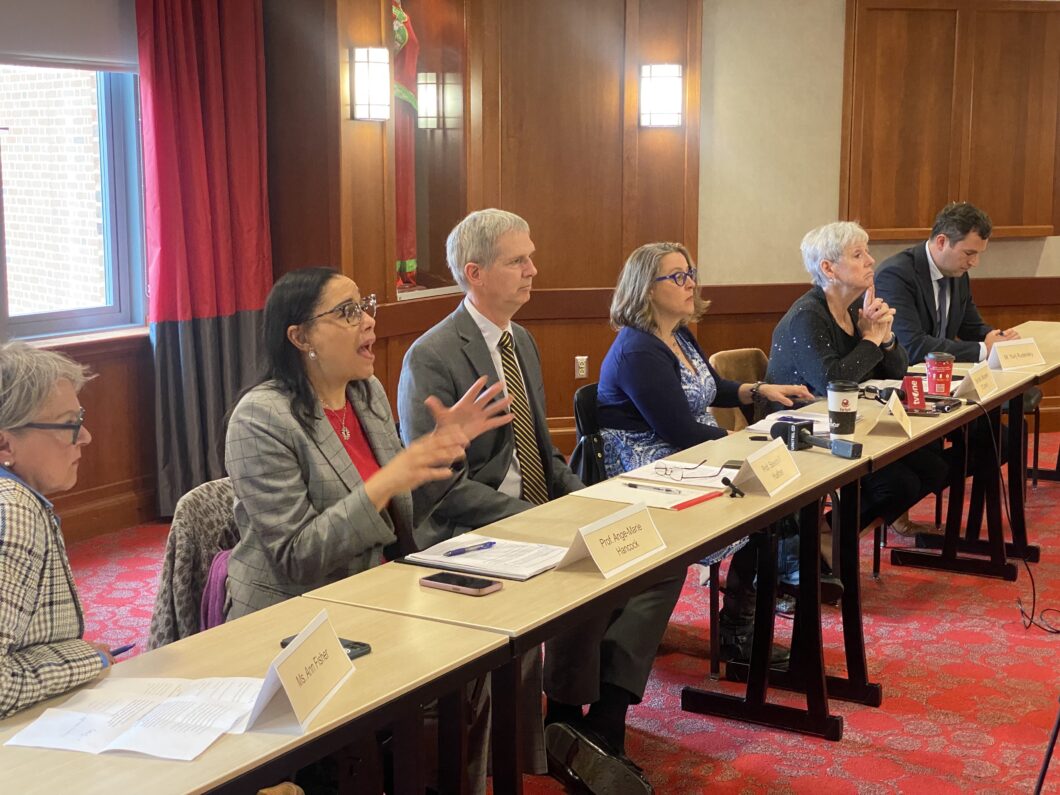A proposed constitutional amendment to reform Ohio’s redistricting process is necessary to protect voters and the issues they care about, voting and legal experts said Monday at a forum on gerrymandering at The Ohio State University.
The current state redistricting commission, a seven-person board consisting of elected statewide officials, was created by politicians for politicians, said Jen Miller, executive director of the Ohio League of Women Voters. This system harms voters regardless of their affiliation by giving one party disproportionate power and eliminating competition.
“Regardless as to whether they see themselves as Republican, Democrat, or Independent, whether they are young or old, regardless as to whether they live in rural or urban areas, every voter is harmed when lawmakers know that they will win their election again,” Miller said.
Law students, community members and Ohio State faculty and staff were in attendance at the forum in the Ohio Union that was moderated by former WOSU radio host Ann Fisher.
Petitions are circulating in the state to place the Citizens Not Politicians Amendment on the November ballot to replace the current commission with a non-politician commission chosen by a bipartisan panel. The nonpartisan coalition must collect 413,487 valid signatures of registered voters by July 3, 2024 to qualify for the 2024 Ohio General Election Ballot.
Voters approved the current Ohio Redistricting Commission in ballot issues in 2015 and 2018. Although voters successfully indicated their desire for a change, the implemented commission didn’t work as intended, said Steven F. Huefner, Legislation Clinic Director, C. William O’Neill Professor in Law and Judicial Administration, at the Moritz College of Law.
The drive to create the new citizens commission arose after years of litigation in which the Ohio Supreme Court rejected the politician-drawn maps as unconstitutional five times, and the congressional maps as unconstitutional twice.
The Ohio Citizens Redistricting Commission will consist of 15 citizens, including five Republicans, five Democrats, and five Independent voters unaffiliated with the two majority parties. A bipartisan screening panel of four judges split between political parties will select the commission members. The proposal would ban current or former politicians, political party officials, and lobbyists from sitting on the commission. It would require fair and impartial districts by making it unconstitutional to draw voting districts and mandate that the commission operate under an open and independent process.
If approved, the new commission could draw maps that could be in place as early as the 2026 elections.
Although gerrymandering—drawing maps to favor one party over the other—is a long tradition on both sides of the political spectrum, sophisticated computer modeling has allowed the creation of maps of unprecedented extremes that reduce voters and communities to partisan labels, said Yurij Rudensky, Senior Counsel in the Brennan Center’s Democracy Program.
“When you draw districts that are focused on communities you will see a different type of politics emerge because candidates can run and speak to issues that aren’t just the high-level partisan issues of the day,” Rudensky said. “They can speak to the needs, to the issues that people face day in, day out, in their immediate communities.”
Independent citizen commissions for redistricting ensure all aspects of the map-drawing process are public, from hearings where input is taken to the actual nuts-and-bolts creation of the maps, said Ange-Marie Hancock, Professor of Political Science and Academic Executive Director of the Kirwan Institute at Ohio State.
“Voters want to know that folks are not taking advantage, that folks are doing what they’re supposed to do, what their oath of office demands,” Hancock said.
The measure will result in a government that is more effective and responsive to the people, said Maureen O’Connor, the former Ohio Supreme Court chief justice who ruled with the majority declaring the current maps unconstitutional.
“That is something that results in compromise and shared vision and shared means of getting things accomplished, and there will be products that are not extreme,” O’Connor said. “In other words, the legislation will be tempered by the fact that there is a new mindset—we need to work for the citizens, not lobbyists, not the people who funded our campaigns.”
The amendment and updated summary can be found at www.citizensnotpoliticians.org/petition.

